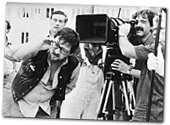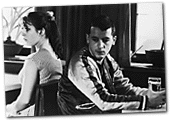FASSBINDER AND HIS FRIENDS
 |
| Rainer Werner Fassbinder on the set of Lili Marleen (1980) Photo: Museum of Modern Art, 1996 |
Everett Lewis
The current Fassbinder revival begs several questions. Why did he disappear? Why is he being revived? And what is the underlying value of his revival?
When Fassbinder died, one felt a general sigh of relief; the culture didn't have to deal with all those films anymore. And a year later he was really gone, wiped clean from cinema. I remember conversations with friends at the time about how gone Fassbinder really was; it was as though he never existed. And frankly, his troublesome modernism seemed old fashioned. We Americans were about to become the "American Independent Filmmakers." In short, Fassbinder disappeared because something else was about to happen that he may have influenced and even engendered, but to which he was irrelevant. We have to murder our parents; we forgot Fassbinder.
Well, we progressed all right. For a while, say up 'til '92, there really was an "Independent Movement." But when studios started buying up the indie distributors, those fledgling studio arms started buying only those films which satisfied studio taste. (I had a representative of one of those distributors say to me, "Yeah, your film might make a couple of million, but we need to make $30 million from a picture now.") So now, in 1997, when we're in the American Rococo end phase of the "Independent Movement," I think we realize what we've lost. Fassbinder is being revived because not only is he an antidote to the dreck being passed off as independent, but because more of his defining strengths are "visible" now. Resolutely uninterested in commerciality, Fassbinder was innovative, devoted to "cinema," hard to take (sometimes hard to watch), endlessly challenging, never complacent, demanding, and so goddamned prolific! Now that there's nobody like him, we see how rare he was. Because we've fallen so far, failed so poorly, Fassbinder shines.
Fassbinder has value as a role model for anyone still interested in a career as an independent filmmaker (if such a thing is possible). His career demonstrates that even the most resolutely personal, erratic, visceral, inconsistent, sexual, intellectual, and iconoclastic visions can and should be pursued. There's nobody else working with all those cylinders popping now - and that's why he's back and why we revere him.
Harmony Korine
It is known that Fassbinder's ninth favorite actor was Zeppo Marx. Anthony Quinn's sixth favorite artist is Velazquez. In A Year of Thirteen Moons, a crossdresser (Volker Spengler) takes a stroll through a slaughterhouse where cows are destroyed. This reminds me of Anthony Quinn's face.
 |
| Jail Bait (1972), Photo: Museum Of Modern Art, 1996 |
Mother: The Nazis had their faults.
Father: I would rather 100,000 Jews murdered than this happen to us!
It is also a well known fact that Fassbinder used to whore out his actresses for the purposes of financing his films. In an interview Fassbinder mentioned that for one year straight he used to walk around with a copy of Alfred Doblin's Berlin Alexanderplatz in his back pocket, but this got me upset because the book is extremely thick, well over 600 pages, and his pants at that time were very tight. There was no possible way the book could have fit. It was around this time that I lost interest in Fassbinder. Also, Douglas Sirk makes me sick.
Tom Kalin
There is not a Fassbinder film that I haven't liked or found kind of moving. What is curious about his films for me is that while I rarely remember the plots, I can remember vividly events in the films. They are not exactly tableaus or vignettes, but particular moments.
It is like what I find remarkable in Douglas Sirk or Bette Davis, that melodramatic and full consciousness of an actor, that thing they some times call star presence. It is like the Warhol superstar, the just beingness of a person.
For Fassbinder, who continually used the same actors over and over again, the actors were stars in their own universe, continually playing out different roles on an almost heroic scale. At particular moments, the stars, the actors, would outshine the roles, and it is at these moments the films literally became vehicles for the stars, providing the space for these moments to occur.
For me, there is a moment like that in Lili Marleen. I remember perfectly Hannah Schygulla spinning round and round with a mirror and then finally collapsing on the bed with an exuberant narcissism. It was a moment that was so real and so felt.
That is what I was first attracted to. I so identified with these women, especially Hannah Schygulla. I remember when it opened there was some controversy within the gay community around The Bitter Tears of Petra von Kant. Fassbinder was not a gay liberationist in the same way that Patti Smith was not a feminist. He was certainly transgressive, but there was a real, erratic, visceral quality that was at once highly stylized and deeply felt.
I saw Querelle on its first release and was very intrigued by it. The first time, though, I found it stilted, fragmented and strange. Years later when I saw it again, I really loved it. What I had liked in Fassbinder was the electrifying presence of different women, especially Hannah Schygulla; but Querelle is so much not about that. Brad Davis is the mute, acted-upon person. And putting this passive American actor against Jeanne Moreau gave Davis a walking Tom-of-Finland quality. It is a gesture of a great director - the sailor and the bar chanteuse, the cartoon quality of their characters. A friend once gave me a Brazilian comic book version of Venus in Furs. And Querelle had the same quality; its color and lushness were not sensuous, but they caught what was both brutal and real in the world.
Lynne Stopkewich
I grew up in suburbia. Was taught that everything is A-O.K. Went to art school. Was challenged to rebel. Huh?! In comes Rainer Werner Fassbinder. Based on Theodor Fontaine's novel, his Effi Briest exposed the inner torment and social punishment a woman suffers when she is forced to repress her true passion by a community in which the "flawless" status quo must be maintained, no matter what. The film is a brilliantly melodramatic piece which maintains a cool, aesthetically driven tension and thereby creates critical distance. It was like Bertolt Brecht meets Douglas Sirk. After that, things for me were never the same. I painted the opening quote from Effi Briest on my bedroom wall in black: "...or, many who have an inkling of their possibilities and needs nonetheless accept the prevailing order in their head in the way that they act, and thereby strengthen and confirm it absolutely."
I decided to become a filmmaker. My folks were mortified. Through Fassbinder's films, I could see a way to express my suburban angst in both a seductive and subversive way. He made the invisible visible and did it in a way which, I believe, profoundly changed world cinema. Given our post-postmodern state of affairs, Fassbinder's cinema, with its intensely controlled yet passionate eye, is truly timeless.
Ira Sachs
I cannot name one favorite Fassbinder film, because I like different ones in different moods. The three that I think about most often are Ali: Fear Eats the Soul, The Bitter Tears of Petra von Kant, and Veronika Voss. Each of these films combines a ripe sadness with a simple beauty that leaves me in a perfect state of melancholy. They are also the three that have moved me the most directly without any need to be an intellectual about it. Like the first time I saw Sirk's Imitation of Life when I was a teenager and found myself crying unexplainably. It was before I knew Sirk was "Sirk," and the movie just got me. Those Fassbinder films work for me like that. I guess I like the ones that I think of as "women's pictures" more than the early ones that come out of the anti-theater, or the more obviously gay ones, which are suffused with so much cruelty. I don't think Fassbinder liked men all that much, gay or straight, actually. He might empathize with men, but he saves his sympathy for the women.
Having made so many films so quickly, Fassbinder seemed to avoid two important things in his work: preciousness and self-importance. Since there was always another movie, each one was not burdened with being "big." Maybe in his last years that changed somewhat, but in most of his career he knew the power of a small story well told. Supposedly, if something was not working out while he was making one film, he would say that he'd fix it in the next one. Keep going, move on. I think that's how he managed to take so many great risks; he had the courage of imperfection. But he was never careless, and I believe that was because his intentions were always very clear: to provide images, and tell stories that have as much feeling as possible; not emotion, which he often instructed his actors to hide, but feeling.
I don't think Fassbinder was an inventor like Welles or Ford, for example. His mise-en-scene might look like Ophuls, his plot lines recall Sirk, but he was throwing it all back at the audience in his own utterly singular way. His genius was synthesis.
It might have something to do with the fact that I don't understand German and have to rely on the subtitles, but his characters speak so bluntly. They speak their emotions. He seems fearless of sentiment, and I admire that.
Jon Moritsugu
When I was 21 and living in Providence, I saw Fassbinder's Querelle. It deeply affected me, and I still consider it one of my favorite films. Combining kitsch with culture, it is the ultimate synthesis of high and low art, sperm and semiotics. Querelle resonates with a distinct but beautiful weirdness. Querelle is like a piece of candy that has been dropped in the dirt - glistening, sweet, and beautiful but covered with sand, hairs, and shit. It is simultaneously pristine and rotten, vulgar and erudite.
Todd Verow
Watching Fassbinder's films again I was struck by how uniformly strong the performances are. The same actors transform from film to film with astounding, sometimes frightening realness. My favorite? Satan's Brew, a film that is both hysterically funny and just plain hysterical. In his work, Fassbinder exposes the artist as tyrant. He knew that filmmakers are akin to fascists, sadists and, at times, masochists. Experiencing Satan's Brew again made it glaringly obvious to me that there is something missing in our contemporary cinema. Instead of featuring living, breathing characters who illuminate the human condition, many new films are only interested in creating political motivation, soapboxing and "correct" statements suitable for chit-chat. These films are anti-Fassbinder; they replace empathy with rhetoric.
VOD CALENDAR


 See the VOD Calendar →
See the VOD Calendar →


